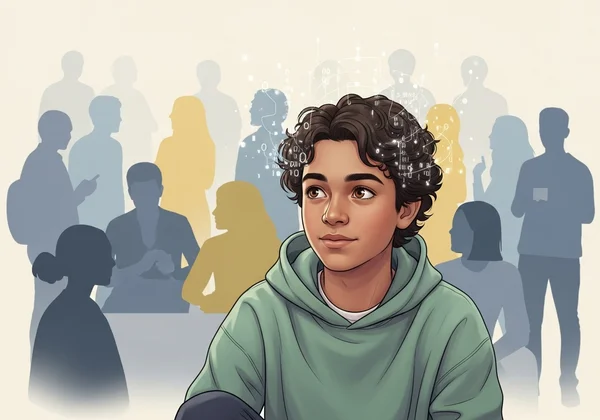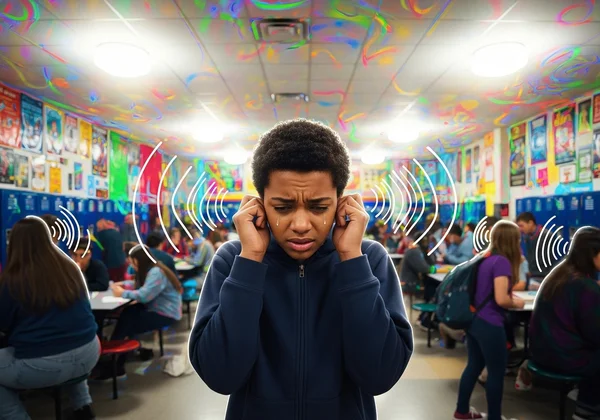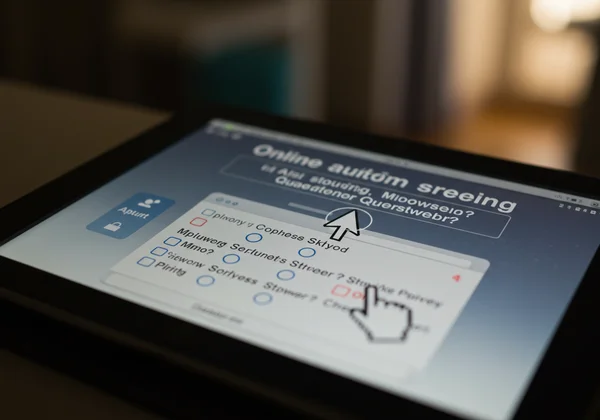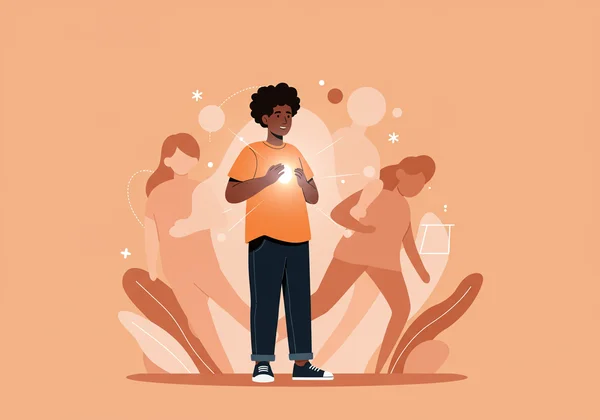Autistic Test for Teens: Signs, Screening & Support
August 10, 2025 | By Silas Archer
For many, the teenage years are a whirlwind of self-discovery, rapid changes, and often, confusing questions. For many teens and their parents, questions arise about why certain social interactions feel challenging or why specific routines are so important. Are these just typical teenage quirks, or could they be signs of something more? You might be wondering, how do I know if I'm autistic? This guide is here to provide clarity and support. We'll explore common autistic traits in teenagers and explain how a preliminary online autistic test for teens can be an empowering first step.
Getting to know yourself better is a significant journey, and finding a starting point can make all the difference. For those exploring the possibility of being on the autism spectrum, a confidential and accessible screening can provide valuable insights. It’s a way to transform uncertainty into understanding. If you're ready to begin that process, you can take our free autistic test as a first step toward making exploration easier.

Understanding Autism Signs in Teenagers
Autism is a spectrum, meaning it presents differently in everyone. During the teen years, when social pressures intensify, these traits can become more noticeable. Understanding them is key to providing the right support and fostering self-acceptance. Instead of a single sign, it's typically a pattern of traits across several key areas.
Social & Communication Differences
For many autistic teens, navigating the complex and often unwritten rules of social interaction can feel like trying to play a game without knowing the rules. This might manifest as difficulty understanding sarcasm, figurative language, or subtle body language cues. They may prefer direct, literal communication and find small talk confusing or pointless. While they desire friendships, initiating and maintaining them can be a source of anxiety.
Repetitive Behaviors & Restricted Interests
A core aspect of the autistic experience involves a preference for routine and predictability. This can include having deep, passionate interests in specific topics, often called "special interests." An autistic teen might be an expert on anything from ancient history to a particular video game. They may also engage in repetitive movements known as "stimming"—such as fidgeting, pacing, or rocking—which serve as a way to self-regulate emotions and manage sensory input. These routines and interests provide a sense of comfort and order in a world that can feel chaotic.
Sensory Sensitivities in Teen Life
The world can be an intense place for someone with sensory sensitivities. Common teenage environments like bustling school hallways, loud cafeterias, or crowded social events can be overwhelming. A teen might be highly sensitive to specific sounds, bright lights, strong smells, or the texture of certain foods or clothing. Conversely, they might be under-sensitive and seek out strong sensory input. This isn't being "picky"; it's a genuine neurological response.

Executive Function Challenges
Executive function refers to the brain's "management system"—the skills that help us plan, organize, initiate tasks, and manage time. Many autistic teens experience challenges in this area. This can look like difficulty starting homework, keeping their room tidy, or remembering deadlines, even when they are intelligent and capable. It’s a difference in how the brain processes and prioritizes information.
Masking: When Teens Hide Their Traits
To fit in with their peers, many autistic teens learn to consciously or unconsciously hide their autistic traits. This is known as masking or camouflaging. They might force eye contact even when it's uncomfortable, suppress stims, or rehearse social scripts to navigate conversations. While masking can be a survival strategy, it is incredibly mentally and emotionally exhausting and can lead to burnout and anxiety.
Why Consider a Teen Autism Screening?
Recognizing these traits is the first step, but what comes next? An online screening can be a pivotal tool for both teens and their parents. It provides a structured way to explore these feelings and observations in a private, pressure-free environment.
The Value of Early Self-Exploration
For a teenager, discovering they might be autistic can be validating. It provides a framework for understanding a lifetime of experiences and feeling "different." This self-exploration isn't about applying a negative label; it's about gaining a positive identity and finding a community of people with similar experiences. It can empower a teen to advocate for their needs and embrace their unique strengths.
How an Online Autistic Test Works
An online autistic traits test is not a medical diagnosis. Instead, it is a screening questionnaire designed to identify the presence and intensity of traits commonly associated with autism spectrum disorder. These tests are often based on scientifically validated tools like the Autism-Spectrum Quotient (AQ) Test, originally developed by Simon Baron-Cohen and his team. By answering a series of questions about social preferences, patterns of thought, and sensory experiences, you receive a score that indicates whether you have a high number of autistic traits.

A Free & Confidential Screening Tool
Our platform provides a free, science-informed, and completely confidential autistic screening tool. Our test is designed to be an accessible starting point for self-discovery. After completing the initial questionnaire, you receive an instant summary. You also have the option to receive a more comprehensive, AI-powered report that offers personalized insights into potential strengths, challenges, and actionable next steps. This tool is designed to empower you with valuable knowledge.
Next Steps After an Online Autistic Test for Teens
Receiving a high score on an online autism screening can bring up a mix of emotions—relief, validation, and perhaps some new questions. It’s important to remember that this is the beginning of a journey, not the end. Here’s how you can move forward with support for autistic teens.
Interpreting Your Teen's Test Score
Your interpreting score is a data point, not a verdict. A high score suggests that the teen exhibits a significant number of autistic traits and that further exploration with a professional is a good idea. Use the results from an online autistic test as a catalyst for a supportive conversation. Discuss which questions resonated and how these traits appear in their daily life.
Seeking Professional Evaluation & Diagnosis
The only way to get a formal diagnosis is through a professional evaluation. This is typically conducted by a clinical psychologist, psychiatrist, or neurologist with expertise in neurodevelopmental conditions. You can learn more about the formal diagnostic process from authoritative organizations like the National Autistic Society. A formal diagnosis can be crucial for accessing academic accommodations (like an IEP or 504 plan), workplace support, and specialized therapies. Your screening results can be a valuable document to bring to this appointment.
Navigating Support for Autistic Teens
Support comes in many forms. It can mean finding a therapist who specializes in neurodiversity, joining an online or in-person support group for autistic teens, or simply having open conversations at home about needs and boundaries. School counselors can also be an excellent resource for navigating academic life. The goal is to build a network that celebrates the teen for who they are.
Empowering Your Teen's Journey
Ultimately, this journey is about empowerment. It's about helping a teenager understand their unique brain, develop strategies for navigating challenges, and lean into their incredible strengths—whether that’s intense focus, a strong sense of justice, or a unique creative perspective. Self-knowledge is a superpower.

Disclaimer: This test is a screening tool, not a diagnostic instrument. While it can provide valuable insights and indicate the presence of autistic traits, it cannot replace a comprehensive evaluation from a qualified healthcare professional. Please consult a professional for a formal diagnosis.
Empowering Teens on Their Journey of Self-Discovery
The path through the teenage years is unique for everyone. For those wondering if they might be autistic, it can feel isolating. But understanding is the key that unlocks acceptance and support. By recognizing the signs, using accessible tools for exploration, and seeking the right guidance, teens can move forward with confidence.
This journey of self-discovery is a powerful one. If you or your teen are ready to take the first, confidential step, begin your test today. Let knowledge empower your path forward.
Frequently Asked Questions About Autistic Teens & Screening
What are common autism signs in teenagers?
Common autism signs in teenagers often fall into several categories. These include differences in social communication (like difficulty with sarcasm or small talk), having intense and specific interests, a strong need for routine, repetitive behaviors (stimming), and heightened sensory sensitivities to things like noise or textures. Many teens also experience executive function challenges and may engage in "masking" to hide their traits.
Is an online autistic test accurate for teens?
An online autistic test is accurate as a screening tool. It is designed to effectively identify the presence of autistic traits based on established research. However, it is not a formal diagnosis. Think of it as a reliable first step to see if pursuing a professional evaluation is warranted. Our free autistic spectrum test is a science-informed way to start this exploration.
What should we do after a high score on an autistic test for teens?
A high score is an indicator that you should explore further. The best next steps include having an open, supportive conversation with your teen about the results and their feelings. Then, use this information as a basis for seeking a comprehensive evaluation from a qualified healthcare professional, such as a psychologist or psychiatrist specializing in autism.
Can a teenager be "slightly" autistic?
Autism is a spectrum, which means there is wide variation in how traits present. The concept of being "slightly" autistic reflects this reality. Some individuals may have several traits but not to a degree that significantly impacts their daily life, while others may require more support. An autism screening test can help you understand where on this spectrum of traits you or your teen might fall.